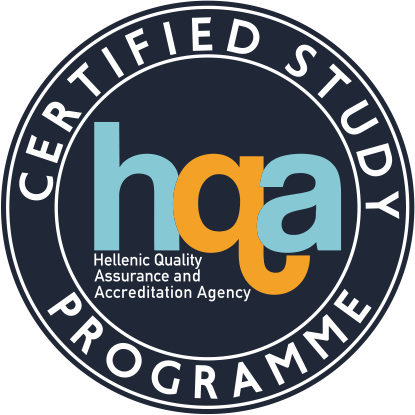History of Civilization
Undergraduate level | 1st semester | Compulsory Unit | ΓΕ2300
Credit Units ECTS: 5
Teaching Hours Weekly: 3
Course Type: Specialised general knowledge
Prequisites: --
Teaching and Examination Language: Greek
For Erasmus students study course and exams are offered in English.

Course Material
Introduction: The concept of Civilization-Elements, Morphology, Carriers and Factors of Civilization. The concept and aspects of Art. The age of Stone. The first Civilizations. The Ancient Greek Civilization. The Roman Civilization. The Byzantine Civilization. The Islamic Civilization. The Medieval Western Civilization. The Renaissance. The Civilization of 17th century. The Civilization of 18th century. The Civilization of 19th century. The Civilization of 20th century. The current meeting of Civilizations.
Learning Outcomes
Upon completion of the course the students will have:
- acquired a general knowledge about the evolution of Civilization from Antiquity till nowadays
- cultivate their critical thought, develop their aesthetics
- acquired a broader humanistic culture
- acquired the necessary knowledge for understanding courses in following semesters
General Skills
The successful completion of the course contributes to the achievement of the following program outcomes:
- Respect for the heritage
- Respect for difference and multiculturalism
- Team work
- Search for, analysis and synthesis of data and information, with the use of the necessary technology
- Public presentation
Learning and Teaching Techniques - Evaluation
Teaching Methods: Face to face
Use of ICT: - Use of digital slides in lectures - E-learning platform - Communication with students via email
Course Organization:
| Activity | Semester Work Load |
|---|---|
| Lectures | 20 |
| Educational Visits- Experiential Learning | 35 |
| Individual/non-guided studying. Project. | 35 |
| Tutorials | 35 |
| Total | 125 |
Assessment Methods:
Language of evaluation: Greek (English for Erasmus Students) Methods of Evaluation:
- Written final examination of the course content including sort- answer questions (100%) or
- Written final examination of the course content including sort- answer questions (70%) + Group Project (Public Presentation) (30%).
- Erasmus students: Project in English (100%).
Evaluation Criteria:
Knowledge, Exponential ability, Thought Organization, Research capacity, Critical and Synthetic ability.
The abovementioned criteria are described to the students during the first teacher-student meeting, and are displayed in the e-class website throughout the semester.
Suggested bibliography
- Charalampidis, Α. (2010), Art. I see- I know- I feel, Thessaloniki: University Studio Press (in Greek)
- Chambers, M., Grew, R., Herlihy, D., Rabb, Th, Wolloch, I. (1987). The Western Experience, New York: Alfred A. Knopf.
- Chatelet, A. & Groslier, B. (2003), Histoire de l'art, Paris: Larousse (in Greek translation)
- Cole, J., Symes, C., Coffin, J., Stacey, R. (2005),Western Civilizations: Their History and Their Culture, New York: WW. Norton & Company.
- Georgitsoyanni, E. (2011), Introduction to the History of Civilization, Athens: Diadrassi (in Greek)
- Gombrich, E. (2011), The Story of Art, London: Phaidon
- Honour, H. & Fleming, J. (2009), A World History of Art, London: Laurence King Publishing.
- Papanikolaou, Μ., (2005), Greek art of 18th and 19th century, Thessaloniki: Vanias (in Greek)
- Perry M. (2012). Western Civilization: A Brief History, Boston: Cengage
Related academic journals:
- History Today
- World History Connected
- Art History
- Art Journa



